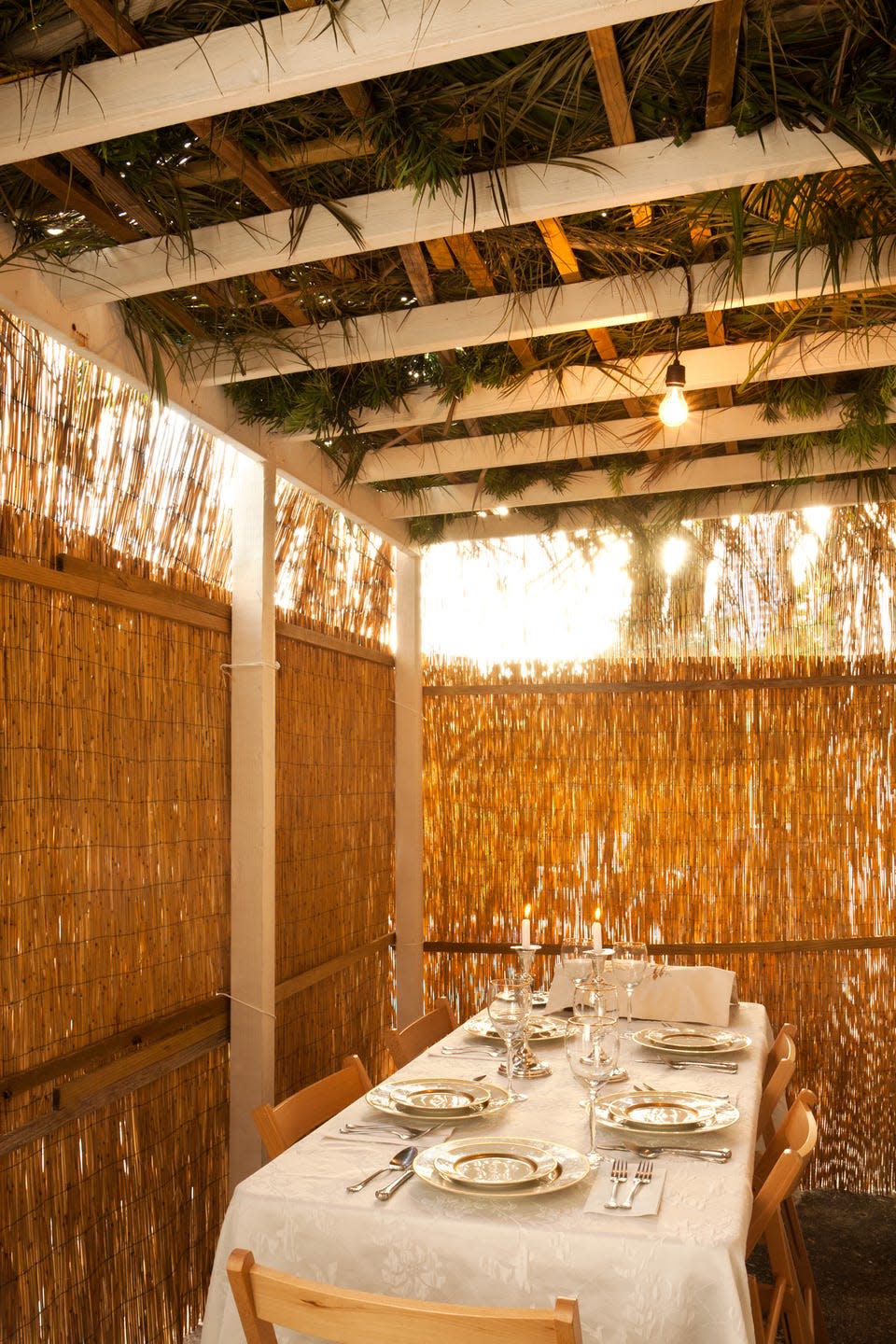“Hearst Magazines and Yahoo may earn commission or revenue on some items through these links.”
Each year, right around the time many Americans are peeping fall foliage, clutching spiced lattes and flocking to pumpkin patches, Jewish people around the world are observing the holiday of Sukkot, the harvest holiday commemorating the protection God provided for the Israelites after the Exodus from Egypt.
“Sukkot, an ancient fall harvest festival that predates the Bible, is the Jewish Thanksgiving,” explains Rabbi Dr. Jo David. “It is a time to connect with nature in meaningful ways and to reflect on our responsibility as stewards of the earth.”
Beyond that, Sukkot also commemorates the Jewish diaspora outside the land of Israel, says Mike Gutter, Jewish historical expert and author of Never Again Still Means Never Again. “Like most Jewish holidays and observances, it ties all Jews together worldwide,” he says. “Jews have always been tied to one another through our religion and customs, and Sukkot is another example that no matter where we are in the world, we, as Jews, are always together.”
Read on to learn more about the festive Jewish holiday of Sukkot, how it’s celebrated, and when it falls on the calendar this year.
What is Sukkot, and how is it celebrated?


Sukkot is a weeklong festival that commemorates the 40 years that the Israelites wandered in the wilderness after the Exodus from Egypt. During Sukkot, Jewish people traditionally build and dwell in a temporary booth, or hut, called a sukkah (the plural of sukkah is sukkot). “Our sukkot are meant to remind us of the huts the Israelites stayed in while wandering in the wilderness,” says Rabbi Robyn Frisch.
The roof of a sukkah is made up of s’chach, which must come from natural materials that grew from the ground, like branches, reeds, bamboo and leaves. “Spending time in a sukkah provides the opportunity to connect with nature,” she says. It’s also a time for connecting with family and friends.
“Sukkot and the practice of dwelling or eating in a sukkah offers meaningful opportunities for spiritual reflection, personal growth and communal bonding,” she says, “All while having fun!”
What is done on each day of Sukkot?
“The entire Sukkot festival is very festive,” Rabbi David says. “Hospitality during Sukkot is extremely important as a way to give thanks for the bounty of the earth and the compassion of the divine. It is traditional to invite relatives and friends to dine in the sukkah. In many communities, dining in the sukkah is an excellent opportunity to reach out to people of all religious and cultural backgrounds.”
As well, on each day of Sukkot, except Shabbat, the lulav and etrog are central components of Sukkot ritual. The lulav is a bundle consisting of three myrtle branches (hadasim), two willow branches (aravot) and a palm frond (lulav also refers to the entire bundle of the palm, willow and myrtle). The etrog is a citron fruit with a pleasant fragrance. “Together the lulav and etrog are shaken in six directions — north, south, east, west, up and down — to symbolize that God is everywhere,” Rabbi Frisch explains.
The seventh day of Sukkot is known as Hoshana Rabbah. On this day in synagogues, attendees take their lulav and etrog for a special procession. During services the congregation processes around the sanctuary seven times while reciting the Hoshanot prayers, asking God to redeem the Jewish people, mainly by sending rain. “Additionally, the congregants beat the willow branches from their lulav on the ground after each procession, an act that symbolizes the attempt to rid ourselves of sins that might affect God’s decision to send rain,” Rabbi Frisch explains.
What is forbidden during Sukkot?
“In order to maintain the spirit of the holiday,” according to Rabbi Frisch, “there are some things that are traditionally forbidden on Sukkot.”
The first of these practices is work. On the first two days of Sukkot (or just the first day, depending on the community) are festival days. Therefore, similar to Shabbat, many types of “work” (including cooking, writing, and using a phone or electronics) are forbidden. “While this may sound oppressive to those who aren’t used to it, refraining from work can have the positive effect of removing other responsibilities and distractions so that you can focus on the joyous aspects of the holiday,” Rabbi Frisch says.
Beyond that, dwelling inside is forbidden as “the primary commandment for Sukkot is to dwell in the sukkah,” Rabbi Frisch explains. “During the holiday, one is supposed to eat, sleep and spend as much time as possible in the sukkah. Barring rain or other extreme weather conditions, Jewish tradition would have us spend as little time as possible inside during the holiday.”
It must be noted, though, that there are many types of Jews, and while some take the requirements literally, others may not follow all (or any) of the traditional holiday rules. Many Jewish people don’t have their own sukkah, but rather visit one belonging to another friend, family or community member. Others may not spend any time at all in a sukkah during the holiday. “Also, the observance level of some Jews may change throughout their lives,” Rabbi Frisch notes.
When Is Sukkot in 2024?
In 2024, corresponding to the Hebrew year 5785, Sukkot begins at sundown on October 16 and ends at nightfall on October 23.
You Might Also Like







